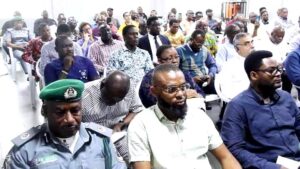The Nigeria Customs Service has engaged stakeholders on Electronic Manifest Transmission process and the need to protect its server from unauthorised access, attacks and abuse.

The E- manifest Transmission is a platform developed by the Nigeria Customs Service to help shipping lines, airlines and strategic stakeholders with ease of business transactions.
Addressing a cross-section of stakeholders representing shipping companies and airlines at the Apapa Customs Command, the Assistant Comptroller General of Customs, ICT/ Modernisation, Saidu Galadima said, the engagement aimed at addressing the challenges faced in the transmission of the E-manifest, highlighting what is obtainable and what is expected of stakeholders.
He emphasised the need for implementing the three-level protocol, that will further consolidate security, and allow access only to authorised personnel carrying out legitimate businesses on behalf of their organisations.
“The breaches on the server are becoming very alarming, which put the integrity of the system at risk. Hence, the need for the management’s resolve to come together, brainstorm and agree on the way forward”, ACG explained.
Lanre Balogun, a representative of the Customs ICT partner from Webb Fontaine Group disclosed that the reason for the issues being faced is that a lot of the concerned companies failed to follow due process and implement the right security architecture as instructed from the onset.
Furthermore, failure to build a front-end page as expected and allow easy access to back-end credentials pose serious server security concerns hence the britches being experienced.
Lanre stated that “We have three security levels on the E-manifest application; a virtual private network (VPN) which is the network layer security, all shipping lines were provided for that, the second level is the server authentication credentials which shipping lines were also provided with and the last, the carrier code.”
He further stated that the idea was for the shipping lines and airlines to design a front-end application where their staff using the manifest will not have access to any of these back-end credentials. Giving every day front-end users the wrong access to our servers posed major threats to our system.
“The idea is to have a separate administration where server VPN and the carrier code are not exposed to any shipping line user because employees come and go, their profile can easily be deactivated from the front end and they don’t have access anymore. This is why all must follow the standard of implementation to avoid security breaches. An angry employee relieved from his duties can change the password and shut the company down” he added.
Reacting to his submission, some of the stakeholders complained about the use of one password for over a decade. They submitted that it is very risky to have a password for so long, as it is open to both internal and external risks which can crash the whole system.
Read Also: Importer of Record in Shipping
Also, multi-factor authentication where one user on the company’s side is not the only custodian, but is granted access when two other people authorise was proposed.
In view of this, Webb Fontaine advised the companies to build their front-end application and improve in-house security to enable easy tracking of issues, noting that too many people having access to the VPN server will cause a lot of problems.
The Nigeria Customs Service notified the shipping companies and airlines of the deadline given for the building of their front-end infrastructure which elapsed on the 30th of September, 2022.
The Nigeria Customs Service said it has sent out circulars to all concerned companies as there will be checks and balances on the level of adherence and non-compliant companies will be sanctioned.
The resolution reached was to drive the process forward while Webb Fontaine was urged to go back to the drawing board to implement some of the concerns raised.
The meeting had in attendance, Malanta Yusuf The Apapa Customs Area Controller, Tincan Island Port Compt. Adekunle Oloyode, CAC PTML Comptroller Suleiman Bomai, CAC MMIA Command Sambo Dangaladima and a host of others.
Kindly like us on Facebook/twitter















